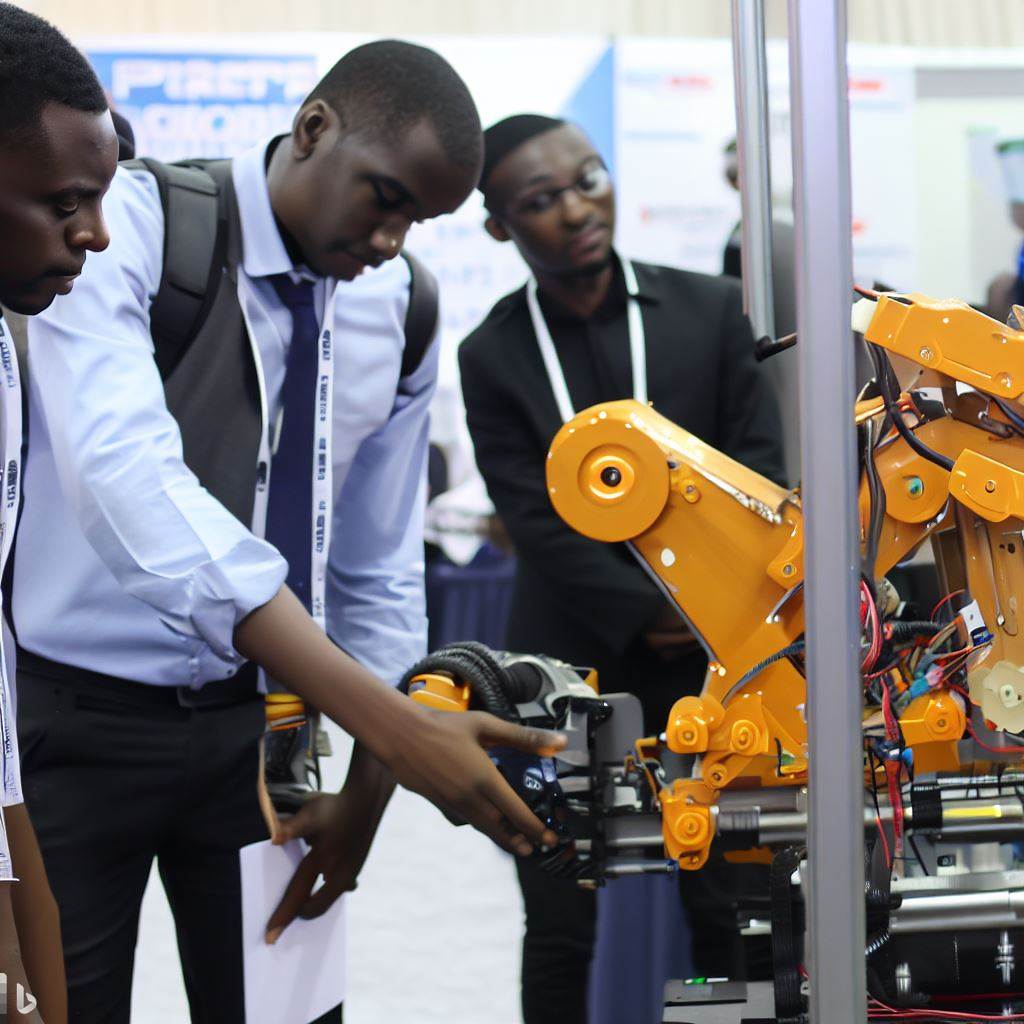Introduction
The burgeoning realm of robotic engineering is swiftly taking shape in Nigeria; however, it is hampered by a deficit in public awareness.
At its core, robotics engineering encompasses the design and development of robots and automated systems.
In Nigeria, the domain is gradually gaining ground, yet public cognizance remains limited. Presently, the landscape of robotics engineering in the country is characterized by its nascent stage.
Nevertheless, notable strides have been made, evidenced by remarkable advancements and accomplishments within the field.
Efforts to cultivate a comprehensive understanding of robotics engineering among the populace are crucial.
Bridging the gap between technological innovation and public perception is imperative for fostering a conducive environment for growth in this promising sector.
As Nigeria ventures deeper into the realm of robotics, dispelling misconceptions and enhancing awareness will be pivotal in shaping a prosperous future for robotic engineering in the nation.
Overview of Robotics Engineering in Nigeria
Robotics engineering is a multidisciplinary field that combines mechanical engineering, electrical engineering, and computer science to design, develop, and operate robots.
In Nigeria, the field of robotics engineering is still emerging but has shown significant growth and potential in recent years.
Notable advancements and achievements in robotics engineering in Nigeria include:
- Development of the “Makoko Floating School” robotic learning center in Lagos, aimed at providing robotics education to underprivileged children.
- Participation of Nigerian students in international robotics competitions, such as the FIRST Global Challenge and the RoboRAVE International competition.
- Establishment of robotics research and development centers in Nigerian universities, including the African Centre of Excellence in Robotics and Artificial Intelligence at the Federal University of Technology, Minna.
- Successful implementation of robotics projects in the agricultural sector, including the use of drones for crop monitoring and automated farming systems.
- Collaboration between Nigerian universities, research institutes, and industry players to promote research and development in robotics engineering.
- Creation of innovative robotic solutions for healthcare, including robotic-assisted surgery, prosthetic limbs, and rehabilitation devices.
- Integration of robotics curriculum in select Nigerian educational institutions to empower students with practical skills for the future workforce.
Public Perception of Robotics Engineering in Nigeria remains a challenge despite advancements. Limited funding and awareness hinder widespread adoption.
To combat this, collaboration between the government, academia, and industry is crucial.
Improved public perception can be achieved through targeted campaigns and showcasing successful applications, particularly in sectors like agriculture and healthcare.
With sustained support and awareness, robotics engineering can significantly contribute to Nigeria’s technological progress, economic growth, and job opportunities.
Importance of Public Perception
Significance of Public Perception for the Growth of Robotics Engineering
- Public perception plays a crucial role in the advancement and acceptance of robotics engineering.
- It shapes the perception of robotics technology, creating opportunities for its growth and development.
- Positive public perception generates interest, trust, and acceptance among potential investors, stakeholders, and end-users.
- It can increase the willingness to embrace and adopt robotics solutions in various industries and sectors.
- Public perception can influence the direction of research, development, and innovation in the field of robotics engineering.
- A favorable perception can lead to increased investment, partnerships, and collaborations within the robotics industry.
Impact of Public Perception on Funding
- Public perception affects the availability of funding for robotics engineering projects.
- Investors are more likely to fund ventures if they perceive a positive public receptivity towards robotics.
- Positive public perception creates a favorable environment for securing grants, sponsorships, and financial support.
- Public perception also influences the decision-making process of funding agencies and organizations.
- When public perception is positive, funding opportunities in robotics engineering are more abundant.
Influence on Government Support
- Public perception plays a crucial role in gaining government support for robotics engineering.
- A positive public perception can convince policymakers to allocate resources, grants, and incentives for the development of robotics.
- It helps create a favorable political climate for funding research institutions, start-ups, and initiatives in robotics engineering.
- Public perception influences the policymakers’ understanding of the societal and economic benefits of robotics.
- A positive perception can lead to the formulation of policies that support the growth and adoption of robotics technology.
Attracting Talent to the Field
- Public perception plays a significant role in attracting talent to the field of robotics engineering.
- A positive public perception creates an attractive image of robotics engineering as a promising career path.
- It encourages talented individuals to pursue education and careers in robotics.
- When public perception is positive, top-tier professionals are more likely to invest their skills and expertise in the field.
- Favorable public perception also attracts international talent, fostering a diverse and innovative robotics community.
In short, public perception serves as a cornerstone for the growth and development of robotics engineering in Nigeria.
It influences funding opportunities, government support, and the attraction of talent to the field.
Positive public perception can lead to increased investment, policy support, and the creation of a thriving robotics ecosystem.
Therefore, efforts should be made to cultivate a positive public perception of robotics engineering to unlock its full potential in Nigeria’s technological advancement.
Factors Influencing Public Perception
Lack of awareness and understanding
One of the key factors that shape public perception of robotics engineering in Nigeria is the lack of awareness and understanding about the field.
Many people in Nigeria are not familiar with the concept of robotics engineering and its applications.
This lack of awareness leads to misconceptions and limited knowledge about what robotics engineering entails.
Without a clear understanding of the field, the public may have unrealistic expectations or underestimate the potential benefits of robotics engineering.
Influence of media portrayal
The media plays a significant role in shaping public perception of robotics engineering in Nigeria.
The way robotics engineering is portrayed in the media can greatly influence how people perceive it.
If the media predominantly portrays robotics engineering in a negative or sensationalized manner, it can create fear and mistrust among the public.
On the other hand, if the media highlights the positive impacts and real-life applications of robotics engineering, it can help generate interest and support.
Cultural and societal beliefs and attitudes
Cultural and societal beliefs and attitudes also influence public perception of robotics engineering in Nigeria.
In some cultures, there may be a belief that robotics engineering is against traditional values or threatens job security.
Moreover, societal attitudes towards technological advancements and innovation can shape how robotics engineering is perceived.
If society embraces change and values technological progress, the public perception of robotics engineering is likely to be more positive.
Education and access to information
Education and access to information are crucial factors that shape public perception of robotics engineering.
The level of education and exposure to accurate information about robotics engineering greatly influences how the public perceives it.
Inadequate educational initiatives and a lack of access to information about the field can contribute to misunderstandings and misconceptions.
Public education programs and initiatives that promote understanding and awareness of robotics engineering can help shape a more informed and positive public perception.
In fact, several factors influence the public perception of robotics engineering in Nigeria.
The lack of awareness and understanding, media portrayal, cultural and societal beliefs, and access to education and information all play significant roles in shaping how the public views robotics engineering.
Addressing these factors through education, accurate media representation, and promoting cultural acceptance of innovation can help shape a more positive and informed public perception of robotics engineering in Nigeria.
Positive Aspects of Public Perception
Public perception plays a pivotal role in shaping the landscape of robotics engineering in Nigeria, yielding a spectrum of positive implications.
- Inspiring Young Innovators: A favorable public perception of robotics engineering can captivate the imagination of young Nigerians.
This newfound curiosity and enthusiasm can pave the way for a surge in aspiring engineers. Arousing interest early on can potentially channel a stream of talented individuals into the field. - Catalyzing Investments and Collaborations: The allure of positive public perception can act as a magnet for investments, both domestically and internationally.
Such funding injections hold the promise of birthing research hubs, nascent start-ups, and symbiotic partnerships with tech giants. This collaborative ethos can further fortify the robotics ecosystem. - Incubating Innovation and Tech Evolution: A nurturing public perception can be the crucible for innovation to flourish. By celebrating robotics engineering, the ecosystem becomes a hotbed for pioneering breakthroughs and evolutionary strides.
This dynamic atmosphere can foster the creation of pioneering robotic technologies on Nigerian soil.
In essence, a rosy public perception of robotics engineering in Nigeria sets the stage for a cascade of affirmative outcomes.
From nurturing the inquisitiveness of the young to attracting vital investments and ultimately nurturing a culture of innovation, the impact is profound.
As perceptions shift positively, the realm of robotics engineering in Nigeria stands poised to scale new heights of achievement and distinction.
Read: Emerging Tech Trends for Petroleum Engineers in Nigeria

Negative Aspects of Public Perception
Discuss the potential negative consequences of an unfavorable public perception of robotics engineering
Lack of funding and resources
- The public’s negative perception of robotics engineering in Nigeria can lead to a lack of funding and resources.
- Without adequate financial support, research and development in robotics technology may suffer.
- This lack of funds may hinder the progress of robotics engineering projects and limit innovation in the field.
- Ultimately, the lack of funding can impede Nigeria’s ability to compete globally in robotics engineering.
Brain drain of skilled professionals to other countries
- An unfavorable public perception of robotics engineering may influence skilled professionals to seek opportunities abroad.
- These professionals, driven by a desire for better support and recognition, may leave Nigeria for countries with a more positive perception.
- The brain drain of talented individuals hampers the growth of robotics engineering in Nigeria.
- It also results in a loss of local expertise, further perpetuating the negative perception of the field.
Limited adoption of robotics technology in various sectors
- Public perception plays a significant role in the adoption and implementation of robotics technology.
- An unfavorable perception can lead to skepticism and resistance from industries and organizations.
- As a result, the adoption of robotics technology in sectors such as manufacturing, healthcare, and agriculture may be limited.
- This limitation hinders the potential benefits that robotics engineering can bring to these sectors, including increased efficiency and productivity.
All in all, an unfavorable public perception of robotics engineering in Nigeria can have significant negative consequences.
The lack of funding and resources, brain drain of skilled professionals, and limited adoption of robotics technology can hinder the progress and growth of the field.
It is crucial to address and improve public perception to unlock the potential of robotics engineering in Nigeria and contribute to its technological advancement.
Read: Local Vs International Opportunities for Nigerian Robotics Engineers
Efforts to Improve Public Perception
There are several ongoing initiatives and strategies in Nigeria aimed at enhancing the public perception of robotics engineering.
These efforts are focused on educating the public, fostering industry collaboration, raising awareness through media campaigns, and implementing government regulations and policies.
Educational programs and workshops
Educational programs and workshops play a crucial role in improving public perception of robotics engineering in Nigeria.
These initiatives are designed to provide knowledge and practical skills to individuals interested in the field.
By offering hands-on training and theoretical knowledge, these programs aim to dispel misconceptions and highlight the potential of robotics engineering.
They contribute to shaping a positive image of the field among aspiring engineers and the general public.
Industry collaboration and public outreach
The collaboration between the robotics engineering industry and the public is vital for improving public perception.
Companies and organizations in the field actively engage in public outreach efforts.
This includes participating in career fairs, hosting public demonstrations, and organizing robotics competitions.
Such interactions provide opportunities for people to witness the capabilities of robotics engineering firsthand, fostering a positive perception of the industry.
Media campaigns and awareness drives
Media campaigns and awareness drives are powerful tools for shaping public perception.
Various media platforms, including television, radio, and social media, are utilized to disseminate accurate and engaging information about robotics engineering.
These campaigns aim to highlight successful projects, showcase the impact of robotics engineering in different sectors, and debunk common myths surrounding the field.
By presenting robotics engineering in a positive light, these initiatives help change public perception.
Role of government regulations and policies
The role of government regulations and policies cannot be underestimated in improving public perception of robotics engineering.
Clear regulations and policies not only ensure the safety and ethical standards of robotics engineering but also provide a framework for its growth and development.
The government’s active involvement in promoting the field through funding, grants, and incentives further boosts public confidence.
It creates an environment conducive to the acceptance and adoption of robotics engineering in various industries, consequently positively affecting public perception.
In general, improving public perception of robotics engineering in Nigeria requires a multi-faceted approach.
Educational programs, industry collaboration, media campaigns, and government regulations all play a crucial role in shaping a positive image of the field.
By collectively implementing these initiatives, Nigeria can foster an environment where robotics engineering is understood, appreciated, and embraced by the public.
Read: The Role of Robotics in Nigeria’s Manufacturing Industry
Success Stories and Role Models
In Nigeria, there have been several success stories of robotics engineers and institutions that have made remarkable achievements in the field, thereby influencing the public perception of robotics engineering in the country.
Success Stories
Nigerian Robotics Engineers: Olusola Ayoola
Olusola Ayoola, a Nigerian robotics engineer, developed a solar-powered robot that can be used for agricultural purposes.
This innovation has significantly improved farming practices and increased crop yields.
Nigerian Robotics Institution: African Robotics Network
The African Robotics Network, based in Nigeria, has been at the forefront of promoting robotics engineering in the country.
They have organized workshops, competitions, and conferences that have showcased the potential of robotics in different sectors.
Nigerian Robotics Engineer: Silas Adekunle
Silas Adekunle, a renowned Nigerian robotics engineer, co-founded Reach Robotics, a company that designs and manufactures entertainment robots.
His success has inspired many young Nigerians to pursue careers in robotics engineering.
Impact on Public Perception
These success stories have had a significant impact on the public perception of robotics engineering in Nigeria.
They have challenged the prevailing stereotypes and negative perceptions surrounding the field, showcasing the immense potential and practical applications of robotics.
By highlighting the success stories of Nigerian robotics engineers and institutions, the public perception has shifted from viewing robotics engineering as a distant and unattainable field to one filled with possibilities and opportunities.
Importance of Role Models
Role models play a crucial role in inspiring future generations of robotics engineers in Nigeria.
The success stories of accomplished Nigerian engineers serve as a source of motivation and encouragement for young individuals interested in pursuing a career in robotics engineering.
When aspiring engineers see individuals from similar backgrounds succeeding in the field, they are more likely to believe that they too can achieve similar feats.
This boosts their confidence and encourages them to pursue their passion for robotics engineering.
Role models also provide guidance and mentorship to aspiring engineers, helping them navigate the challenges and obstacles they may face in their educational and professional journeys.
They serve as a beacon of hope and inspiration, showing that with determination, hard work, and access to resources, anyone can excel in robotics engineering.
Success stories of Nigerian robotics engineers and institutions have played a vital role in reshaping the public perception of robotics engineering in Nigeria.
They have demonstrated the practical applications and impact of robotics in various sectors, challenging stereotypes and inspiring future generations to pursue careers in the field.
Publish Your Professional Profile, Business or Brand
Showcase your expertise, gain trust, and boost visibility instantly on Professions.ng.
Publish NowBy highlighting these success stories and emphasizing the importance of role models, Nigeria can continue to nurture a new generation of innovative robotics engineers who will contribute to the growth and development of the country.
Read: Essential Certifications for Robotics Engineers in Nigeria
Conclusion
The public perception of robotics engineering in Nigeria plays a vital role in its development.
By analyzing the main points discussed in this blog post, we can see that the lack of awareness and misconceptions surrounding robotics hinder its progress in the country.
Robotics engineering is a promising field with the potential to revolutionize various sectors in Nigeria, including healthcare, agriculture, and manufacturing.
However, without public support, it’s hard to attract funding, resources, and skilled professionals.
To develop robotics engineering in Nigeria, we need public awareness campaigns to highlight its benefits.
Educational institutions and the government should collaborate to create more robotics learning opportunities.
By promoting robotics engineering, Nigeria can become a hub for innovation.
The public should understand that robotics is not a threat but a tool to create jobs.
To engage readers and encourage them to take action, we must ask ourselves: How can we collectively change the narrative around robotics engineering in Nigeria?
What steps can individuals, educational institutions, and the government take to bridge the perception gap and promote the growth of robotics in the country?
Only through a concerted effort and a shift in public perception can Nigeria embrace the limitless possibilities offered by robotics engineering and thrive in the fast-paced and technology-driven world we live in.




